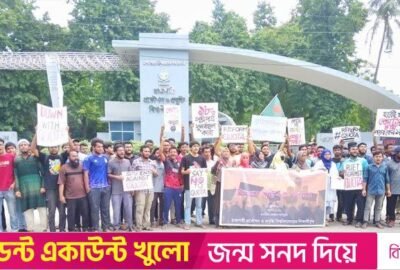Narendra Modi took oath as the Prime Minister of India for the third time in a row. This is one of his records. Earlier, none other than Jawaharlal Nehru could achieve the honor of becoming the Prime Minister of India for three consecutive terms. However, despite being able to become the Prime Minister, the pull in Modi’s popularity has become clear in the poll results. Modi’s party, the BJP, did not win as much as it had hoped. Even BJP as a single party did not get the magic number of 272 seats to form the government. BJP got 240 seats.
BJP had 303 seats in the last election. This time, Narendra Modi himself and his supporters hoped to win more than 400,000 seats, but that did not happen in reality. Modi claimed to be God’s representative but failed to win the hearts of the common voters. Pursuing the policy of secularism, which is played by Hindutva, has become a tough challenge for Modi to fulfill his dream of establishing Ramraj in India.
Rather, the question is now whether he will be able to complete his term as Prime Minister. Modi does not believe in democratic system but in authoritarian mentality. He thinks himself superior to others. But this time he has to sit in power relying on the coalition. The question of how easily Narendra Modi will be able to rule India by keeping the minds of the alliance partners is also coming to the fore.
Bangladesh Prime Minister Sheikh Hasina visited Delhi for two days to attend Narendra Modi’s swearing-in ceremony as Prime Minister. Modi himself invited Sheikh Hasina. In addition to Bangladesh, governments and heads of state of various South Asian countries were present at the oath ceremony.
Modi was first sworn in as Prime Minister in 2014; He also invited world leaders that day. He has maintained it for the third time. As such, the participation of world leaders in the swearing-in ceremony is a regular thing. What is noteworthy this time is that Prime Minister Narendra Modi will hold a private meeting with Bangladesh Prime Minister Sheikh Hasina after taking the oath for the third time, which carries considerable importance politically and diplomatically.
Observer of India-Bangladesh relations Professor Dr. Sriradha Dutta thinks that a ‘broad consensus’ has been formed in India’s Neighborhood Policy. As a result, whether there is a single government of BJP or Congress or a coalition government in India, it will not make much difference. Yes, relations with America or China may be a little bigger, but never with Bangladesh.
As Sheikh Hasina has attended Narendra Modi’s swearing-in ceremony, she is also scheduled to return to Delhi on a state visit at the invitation of the Indian government in two to three weeks. Now coming to Delhi so often, he would definitely not want to return empty handed. Rather, I think, he agreed to these visits because he was given a big promise on issues like Teesta.
Congratulating Modi after winning the election, Sheikh Hasina said in a message on Wednesday, May 5, “On behalf of the people of Bangladesh and myself, I would like to congratulate you on the absolute victory of the Bharatiya Janata Party (BJP)-led NDA alliance in the 18th Lok Sabha elections.” Sheikh Hasina also expressed hope that friendly and close relations between the two countries will continue in all areas in Modi’s new journey with the people’s verdict for the third term.
Meanwhile, the Prime Minister of Bangladesh will go to Beijing after visiting India. Hasina may visit India once more this month. After that he will know. A senior official, who did not wish to be named, said the Prime Minister will visit New Delhi on an official visit and Beijing on July 9-12 as per the dates fixed or changed so far.
Last January, Indian Prime Minister Modi warmly congratulated Bangladesh Prime Minister Sheikh Hasina on her election victory and hoped to continue strengthening the historically close ties between India and Bangladesh. The last bilateral meeting between Prime Minister Modi and Sheikh Hasina took place in September 2023 during the G20 Leaders’ Summit, where Bangladesh was the guest country. Sheikh Hasina has been invited to visit China in July. China is now one of the biggest development partners of Bangladesh. That’s why the visit to China is important for Hasina.
Meanwhile, the Ministry of External Affairs expects Prime Minister Sheikh Hasina to make a full bilateral visit to New Delhi, India separately at a mutually convenient time as per the scheduled schedule where several agreements and MoUs are likely to be signed and some important announcements to be made.
It is not that some people do not make various negative comments about Bangladesh-India relations, but it is noteworthy that despite believing in two opposite political trends, during the period of Awami League and BJP governments, the relations between the two countries have increased instead of cooling. This time may not be an exception.
A new government was formed under the leadership of Sheikh Hasina in Bangladesh and a new government was formed under the leadership of Modi in India. In this situation, it is natural to want to see some new initiatives in the relationship between the two countries, along with the continuity of the relationship.
Modi was sworn in as Prime Minister of India for the third consecutive term on 9 June after the BJP-led NDA coalition won 293 seats in the elections to the 543-member Lok Sabha, the lower house of the Indian Parliament. Earlier, Modi invited Sheikh Hasina to attend the swearing-in ceremony of his government and Bangladesh Prime Minister also accepted the invitation. Modi thanked Prime Minister Sheikh Hasina for her warm wishes after her election victory. Prime Minister Sheikh Hasina was among the first foreign leaders to congratulate Modi, a manifestation of the warmth and personal relationship between the two leaders.
Modi said India and Bangladesh have historic ties, which have grown tremendously in the last decade. Earlier in an X message, Modi said he looks forward to working together to strengthen the people-centric partnership between Bangladesh and India.
The two leaders pledged to continue working together to deepen the historic and close relationship with the goal of achieving India 2047 and Smart Bangladesh 2041. They recognized the significant improvements achieved in the lives of the people of both countries over the past decade and looked forward to further enhancing all ties, including economic and development partnerships, energy security, digital connectivity and people-to-people connections.
Meanwhile, diplomatic and political analysts feel that the BJP government will have to rely on its partners as it does not have a single majority. Therefore, the authority of the BJP and Prime Minister Narendra Modi, which has been seen in the last decade, may not be there in this term. The future of coalition government in India does not look good. Past coalition governments could not complete their term. So the BJP government will not be able to take independent decisions like in the previous two terms in most of the cases. You have to look at the partners.
According to media reports in India, Narendra Modi’s journey as Prime Minister may not be as smooth as the last decade, given the challenges of coalition politics, but it will not have much impact on the country’s foreign policy. Since Modi came to power in 2014, New Delhi has adopted a ‘neighbourhood first’ policy as a key component of India’s foreign policy. According to this policy, the country has focused on repairing and strengthening its relations with countries in the region.
Former Foreign Secretary of Bangladesh Tauhid Hossain told the media, ‘Both New Delhi and Dhaka have security and economic interests. There will be no significant policy change regarding Bangladesh. Because Modi’s allies think about their own state, not about foreign policy.’
Illinois State University professor Dr. Ali Riaz feels, ‘Nothing will stop Modi from realizing his foreign policy goals. Because Indian companies will continue to support the government. There is not much disagreement between the BJP and opposition parties on projecting India as an emerging global power.’
On the other hand, our foreign minister. Hashan Mahmud said, ‘The relationship between India and Bangladesh cannot be compared with any other country. The two countries are bound by blood ties. I will improve this relationship in the future.’
It is not that some people do not make various negative comments about Bangladesh-India relations, but it is noteworthy that despite believing in two opposite political trends, during the period of Awami League and BJP governments, the relations between the two countries have increased instead of cooling. This time may not be an exception.
Author: Politician, Author and Chairman, Bangladesh Foundation for Development Research.
HR/JIM






